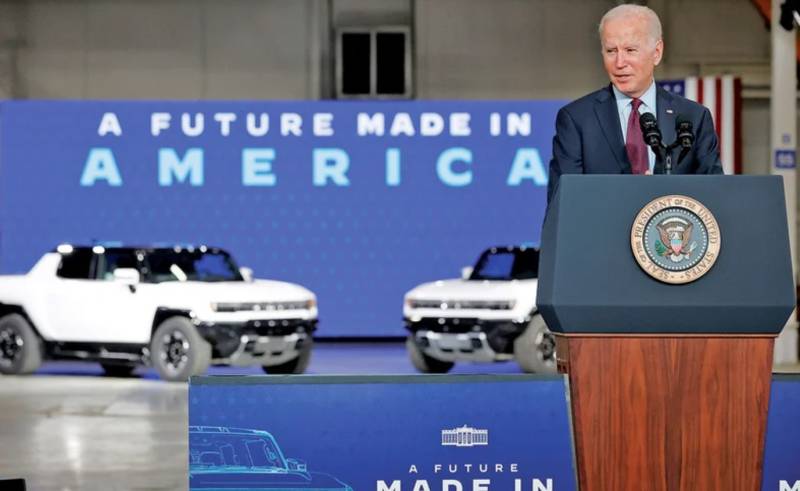
On Tuesday, May 14, US President Joe Biden unveiled plans to impose steep tariffs on a wide array of Chinese goods, including a shock 100% tariff on Chinese manufactured EVs (electric vehicles), 50% tariffs on solar panels, and 25% on batteries, computer chips and medical products.
The Chinese Commerce Ministry has responded that Beijing was opposed to the tariffs, and would retaliate immediately and take measures to defend its interests. The statement from the Chinese foreign ministry claimed that the US was trampling on the principles of a market economy and free trade, and was in violation of international trade rules.
“This is a naked act of bullying,” said Wang Wenbin, a spokesperson at the Chinese foreign ministry.
The trade measures will affect nearly $18 billion of imported Chinese goods, including steel and aluminum, critical minerals, semiconductors and cranes. The announcement also maintains many existing tariffs on Chinese goods that were put in place by the Trump administration.
Biden administration officials suggested that China’s unfair trade practices, like forced technology transfers, intellectual property theft and unfair subsidies, were the reason behind the tariffs.
The office of the US Trade Representative Katherine Tai had recommended higher tariffs on a range of Chinese goods, in an effort to ramp up enforcement aimed at addressing China’s technology transfer measures that allegedly harmed American manufacturers and workers, and to prevent the theft of American intellectual property.
The tariffs, put in place under Section 301 of the 1974 Trade Act, will come into force 90 days from their announcement. The protectionist measures signal a bipartisan departure from the free trade consensus that was dominant in Washington’s policy circles. The previous US president, Donald Trump, also put in place tariffs on Chinese imports, starting a trade war in the process.
Many view the imposition of tariffs as an election year move designed to placate concerns that China is outcompeting the US, and intended to woo voters who are yet dissatisfied with Biden’s domestic economic policy.
While the Biden administration’s tone with China has been less inflammatory than Trump’s, the administration has signaled a commitment to winning its rivalry with China in semiconductor technology, and technologies associated with the green energy transition, such as batteries and solar panels. The tariffs on EVs and batteries seem to be driven largely by fears of Beijing’s domination in emerging carbon neutral technologies, in ways that pose risks to US national security and economic stability.
China, on the other hand, has built up significant capacity in its EV manufacturing industry, so much so that it can meet much of the world’s demand on its own. Chinese EVs sell for as low as $12,000, and giants like CATL and BYD are poised to dominate foreign markets. With China’s domestic economy faltering and struggling with weak demand and consumption growth, Chinese firms are engaged in a rapid search for expansion in foreign markets.
During Chinese President Xi Jinping’s visit to the European Union last week, the European Commission President Ursula von der Leyen expressed concerns about cheap, government subsidized Chinese EV and steel imports flooding the European markets, claiming that “the world cannot absorb China’s surplus production.”
It is no surprise therefore that American politicians and industry also view Chinese manufactured EVs as a serious threat. The Alliance for American Manufacturing claimed in a policy paper that Chinese EVs proliferating in the American market would mean an “extinction level event for the US auto sector.” Even Tesla CEO Elon Musk claimed that Chinese made EVs would “demolish most other car companies in the world.”
Despite its criticism of government support for Chinese firms, the Biden administration has also offered massive support to American EV and clean-energy firms, in the form of subsidies. “We do not seek to have global domination of manufacturing in these sectors, but we believe because these are strategic industries and for the sake of resilience of our supply chains, that we want to make sure that we have healthy and active firms,” Treasury Secretary Janet Yellen claimed.
The Biden administration views these tariffs as necessary to defend key industries and workers, and has staked Biden’s legacy on the US compellingly winning its rivalry with China, with government interventions and subsidies in the semiconductor and EV industries. “We’ve created $866 billion in private-sector investment nationwide — almost a trillion dollars — historic amounts in such a short time, and that’s literally creating hundreds of thousands of jobs,” Biden said during a speech in Wisconsin.

